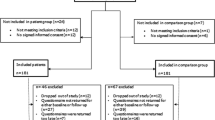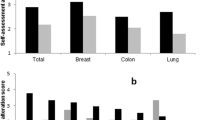Abstract
Purpose
Chemotherapy-induced taste and smell alterations may have a negative impact on the quality of life and nutritional status. A prominent issue when dealing with taste and smell alterations and their consequences on food behavior and well-being lies in the variation arising from individual differences in chemosensory perceptions. The main aim of this study was to examine the effect of individuals’ variation in the severity of taste and smell alterations relative to the stage of chemotherapy on self-reported food behavior and food perception.
Methods
Eighty-nine cancer patients completed a questionnaire subdivided into two parts: a chemosensory part that allowed classification of patients in three groups (“no alterations,” “moderate alterations,” and “severe alterations”) and a food behavior part.
Results
The results highlighted a negative impact of chemosensory alterations on food perception. Compared with patients without taste and smell alterations, patients with severe chemosensory alterations reported significantly more frequent food perception problems, including modification of the perceived taste of food, finding bad taste in all food, and being unable to perceive food taste. Whereas 72% of patients with severe alterations were in late stage, only 37% of patients were in late stage in the no alterations group, indicating an effect of the treatment stage on taste and smell alterations.
Conclusion
Our results underlie the importance of providing specific attention to the severity of chemotherapy-induced taste and smell alterations and considering the individual differences among patients for a better nutritional management.

Similar content being viewed by others
Data availability
The data that support the findings of this study are available from the corresponding author KD upon reasonable request.
References
Lindley C et al (1999) Perception of chemotherapy side effects cancer versus noncancer patients. Cancer Pract 7(2):59–65, avr
Boltong A, Keast R (2012) The influence of chemotherapy on taste perception and food hedonics: a systematic review. Cancer Treat Rev 38(2):152–163, avr. https://doi.org/10.1016/j.ctrv.2011.04.008
de Vries YC et al (2018) Altered food preferences and chemosensory perception during chemotherapy in breast cancer patients: a longitudinal comparison with healthy controls. Food Qual Prefer 63:135–143, janv. https://doi.org/10.1016/j.foodqual.2017.09.003
Epstein J, Phillips N, Parry J, Epstein M, Nevill T, Stevenson-Moore P (2002) Quality of life, taste, olfactory and oral function following high-dose chemotherapy and allogeneic hematopoietic cell transplantation. Bone Marrow Transplant 30(11):785–792. https://doi.org/10.1038/sj.bmt.1703716
Boltong A et al (2014) A prospective cohort study of the effects of adjuvant breast cancer chemotherapy on taste function, food liking, appetite and associated nutritional outcomes. PLoS One 9(7):e103512. https://doi.org/10.1371/journal.pone.0103512
Sánchez-Lara K et al (2010) Influence of taste disorders on dietary behaviors in cancer patients under chemotherapy. Nutr J 9:15, mars. https://doi.org/10.1186/1475-2891-9-15
Belqaid K et al (2016) A longitudinal study of changing characteristics of self-reported taste and smell alterations in patients treated for lung cancer. Eur J Oncol Nurs 21:232–241, avr. https://doi.org/10.1016/j.ejon.2015.10.009
de Vries YC et al (2017) Differences in dietary intake during chemotherapy in breast cancer patients compared to women without cancer. Support Care Cancer 25(8):2581–2591, août. https://doi.org/10.1007/s00520-017-3668-x
Marinho E d C, Custódio IDD, Ferreira IB, Crispim CA, Paiva CE, Maia YC d P (2017) Impact of chemotherapy on perceptions related to food intake in women with breast cancer: a prospective study. PLoS ONE 12(11):e0187573. https://doi.org/10.1371/journal.pone.0187573
K. Drareni, A. Dougkas, A. Giboreau, M. Laville, P.-J. Souquet, et M. Bensafi, Relationship between food behavior and taste and smell alterations in cancer patients undergoing chemotherapy: a structured review, Semin Oncol, vol. 46, no 2, p. 160–172, avr. 2019, doi: https://doi.org/10.1053/j.seminoncol.2019.05.002
de Vries YC, Boesveldt S, Kampman E, de Graaf C, Winkels RM, van Laarhoven HWM (2017) Low reported taste function is associated with low preference for high protein products in advanced oesophagogastric cancer patients undergoing palliative chemotherapy. Clin Nutr Edinb Scotl. https://doi.org/10.1016/j.clnu.2017.12.001
Ovesen L, Hannibal J, Sørensen M, Allingstrup L (1991) Food intake, eating-related complaints, and smell and taste sensations in patients with cancer of the lung, ovary and breast undergoing chemotherapy. Clin Nutr Edinb Scotl 10(6):336–341
Berteretche MV, Dalix AM, d’Ornano AMC, Bellisle F, Khayat D, Faurion A (2004) Decreased taste sensitivity in cancer patients under chemotherapy. Support Care Cancer 12(8):571–576, août. https://doi.org/10.1007/s00520-004-0589-2
S. Steinbach et al., Qualitative and quantitative assessment of taste and smell changes in patients undergoing chemotherapy for breast cancer or gynecologic malignancies , J Clin Oncol vol. 27, no 11, p. 1899–1905, avr. 2009, doi: https://doi.org/10.1200/JCO.2008.19.2690
Yakirevitch A et al (2006) Olfactory function in oncologic hospice patients. J Palliat Med 9(1):57–60, févr. https://doi.org/10.1089/jpm.2006.9.57
Bernhardson B-M, Tishelman C, Rutqvist LE (2008) Self-reported taste and smell changes during cancer chemotherapy. Support Care Cancer 16(3):275–283, mars. https://doi.org/10.1007/s00520-007-0319-7
M. Bossola et al., Taste intensity and hedonic responses to simple beverages in gastrointestinal cancer patients , J Pain Symptom Manag., vol. 34, no 5, p. 505–512, nov. 2007, doi: https://doi.org/10.1016/j.jpainsymman.2006.12.013
Turcott JG, Juárez-Hernández E, De la Torre-Vallejo M, Sánchez-Lara K, Luvian-Morales J, Arrieta O (2016) Value: changes in the detection and recognition thresholds of three basic tastes in lung cancer patients receiving cisplatin and paclitaxel and its association with nutritional and quality of life parameters. Nutr Cancer 68(2):241–249. https://doi.org/10.1080/01635581.2016.1144075
IJpma I et al (2016) Changes in taste and smell function, dietary intake, food preference, and body composition in testicular cancer patients treated with cisplatin-based chemotherapy. Clin Nutr Edinb Scotl. https://doi.org/10.1016/j.clnu.2016.10.013
Brisbois TD, de Kock IH, Watanabe SM, Baracos VE, Wismer WV (2011) Characterization of chemosensory alterations in advanced cancer reveals specific chemosensory phenotypes impacting dietary intake and quality of life. J Pain Symptom Manag 41(4):673–683. https://doi.org/10.1016/j.jpainsymman.2010.06.022
J. L. Hutton, V. E. Baracos, et W. V. Wismer, Chemosensory dysfunction is a primary factor in the evolution of declining nutritional status and quality of life in patients with advanced cancer , J Pain Symptom Manag., vol. 33, no 2, p. 156–165, févr. 2007, doi: https://doi.org/10.1016/j.jpainsymman.2006.07.017
Muscaritoli M et al (2017) Prevalence of malnutrition in patients at first medical oncology visit: the PreMiO study. Oncotarget (8, 45):79884–79896. https://doi.org/10.18632/oncotarget.20168
Kano T, Kanda K (2013) Development and validation of a chemotherapy-induced taste alteration scale. Oncol Nurs Forum 40(2):E79–E85. https://doi.org/10.1188/13.ONF.E79-E85
Bernhardson B-M, Olson K, Baracos VE, Wismer WV (2012) Reframing eating during chemotherapy in cancer patients with chemosensory alterations. Eur J Oncol Nurs 16(5):483–490. https://doi.org/10.1016/j.ejon.2011.11.004
B.-M. Bernhardson, C. Tishelman, et L. E. Rutqvist, Chemosensory changes experienced by patients undergoing cancer chemotherapy: a qualitative interview study , J Pain Symptom Manag., vol. 34, no 4, p. 403–412, oct. 2007, doi: https://doi.org/10.1016/j.jpainsymman.2006.12.010
Speck RM et al (2013) Taste alteration in breast cancer patients treated with taxane chemotherapy: experience, effect, and coping strategies. Support Care Cancer 21(2):549–555. https://doi.org/10.1007/s00520-012-1551-3
Gamper E-M et al (2012) Coming to your senses: detecting taste and smell alterations in chemotherapy patients. A systematic review. J Pain Symptom Manag 44(6):880–895. https://doi.org/10.1016/j.jpainsymman.2011.11.011
Zabernigg A, Gamper EM, Giesinger JM, Rumpold G, Kemmler G, Gattringer K, Sperner-Unterweger B, Holzner B (2010) Taste alterations in cancer patients receiving chemotherapy: a neglected side effect? Oncologist 15(8):913–920. https://doi.org/10.1634/theoncologist.2009-0333
Spotten LE et al (2017) Subjective and objective taste and smell changes in cancer. Ann Oncol 28(5):969–984. https://doi.org/10.1093/annonc/mdx018
E. Cvitkovic, Cumulative toxicities from cisplatin therapy and current cytoprotective measures , Cancer Treat. Rev., vol. 24, no 4, p. 265–281, août 1998, doi: https://doi.org/10.1016/S0305-7372(98)90061-5
Mukherjee N, Pal Choudhuri S, Delay RJ, Delay ER (2017) Cellular mechanisms of cyclophosphamide-induced taste loss in mice. PLoS ONE 12(9). https://doi.org/10.1371/journal.pone.0185473
Boyce JM, Shone GR (2006) Effects of ageing on smell and taste. Postgrad Med J 82(966):239–241. https://doi.org/10.1136/pgmj.2005.039453
Philpott CM, Wolstenholme CR, Goodenough PC, Clark A, Murty GE (2006) Comparison of subjective perception with objective measurement of olfaction. Otolaryngol--Head Neck Surg 134(3):488–490. https://doi.org/10.1016/j.otohns.2005.10.041
Olofsson JK, Gottfried JA (2015) The muted sense: neurocognitive limitations of olfactory language. Trends Cogn Sci 19(6):314–321. https://doi.org/10.1016/j.tics.2015.04.007
Wickham RS et al (1999) Taste changes experienced by patients receiving chemotherapy. Oncol Nurs Forum 26(4):697–706, mai
Padilla GV, Presant C, Grant MM, Metter G, Lipsett J Heide et F (1983) Quality of life index for patients with cancer. Res Nurs Health 6(3):117–126.
Payne SA (1982) A study of quality of life in cancer patients receiving palliative chemotherapy. Soc Sci Med 35(12):1505–1509. https://doi.org/10.1016/0277-9536(92)90053-s.
Akin S, Can G, Aydiner A, Ozdilli K, et Durna Z (2010) Quality of life, symptom experience and distress of lung cancer patients undergoing chemotherapy, Eur J Oncol Nurs 14(5):400–409. https://doi.org/10.1016/j.ejon.2010.01.003.
Acknowledgments
We thank Elior and Infirmerie Protestante (Lyon) teams, particularly Maud Marchand for the help provided in conducting the present study.
Funding
This study is part of the “Taste and Cancer Project” (France), funded by Elior, Apicil, and the National Association for Research and Technology (ANRT).
Author information
Authors and Affiliations
Contributions
KD, MB, AG, and AD discussed and elaborated the design of the study; KD collected and analyzed data; KD drafted the manuscript. All co-authors contributed to results interpretation, revised, and approved the final version of the manuscript.
Corresponding author
Ethics declarations
Conflict of interest
The authors declare that they have no conflict of interest.
Ethics approval
The study was approved by the ethical board of Hospices Civils de Lyon (N.REF: Rech_FRCH_2017; N.REF: Dossier 0024) and was performed in accordance with the ethical standards as laid down in the Declaration of Helsinki.
Consent to participate
Participants provided their consent prior to participating in this study.
Consent for publication
Not applicable.
Code availability
Not applicable.
Additional information
Publisher’s note
Springer Nature remains neutral with regard to jurisdictional claims in published maps and institutional affiliations.
Rights and permissions
About this article
Cite this article
Drareni, K., Bensafi, M., Giboreau, A. et al. Chemotherapy-induced taste and smell changes influence food perception in cancer patients. Support Care Cancer 29, 2125–2132 (2021). https://doi.org/10.1007/s00520-020-05717-1
Received:
Accepted:
Published:
Issue Date:
DOI: https://doi.org/10.1007/s00520-020-05717-1




